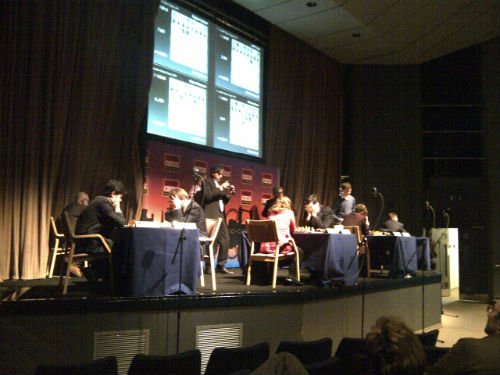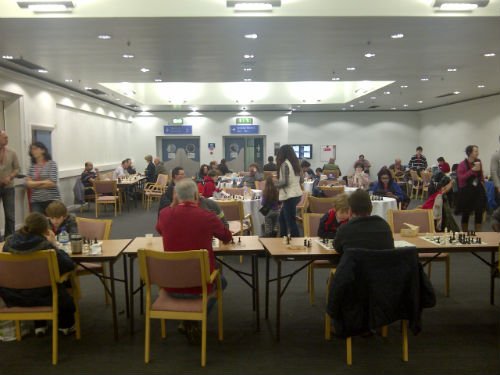
Can there be a stranger human activity than watching people play chess? To sit in an audience looking up at two people seated and staring at a table, thinking? And sometimes thinking for a very long time. I remember one glorious Channel 4 TV transmission at the time of the Gary Kasparaov-Nigel Short world chess championship in 1993, when after the first flurry of moves the two men sat and thought over the next move for the rest of the programme – thirty minutes of looking at two heads with a board between them. Of course there was a commentary which attempted to explain what might be going on inside those heads, but to all intents and purposes the viewer was simply reading minds and faces. Channel 4 has never again made so Warholian a programme.
But there I was, seated near the front row, watching eight people seated at four tables, thinking. This was the London Chess Classic, an annual event held at Kensington Olympia, to which attracts some of the world’s best players. Star-spotting is part of the appeal of going to chess events, of course, and here were Magnus Carlsen (current world no. 1), Viswanathan (Vishy) Anand (the world champion, which rather confusingly is not the same as the world no. 1), world no. 2 Levon Aronian, the greatest of all women players Judit Polgar, former world champion Vladimir Krammik, the world’s leading amateur player Luke McShane, USA no. 1 Hikaru Nakamura, Britain’s no. 1 Gawain Jones and Britain’s best player (again, a tad confusingly for the outsider) Michael Adams. Any chess fan would travel some distance and pay good money to see that lot in a room together.
I’ve been playing and following chess since I was eight or so, probably. I’ve never been much of a player (too absent-minded), but I admire the art of chess hugely, and its great practitioners. So when they turn up, you go and see them, thinking. Of course part of the appeal of watching chess is to think through the moves yourself, hoping to outsmart (mentally at least) the persons actually playing the game. A chess tournament is also an opportunity to be in the company of other chess enthusiasts, and to play chess. Entering the London Chess Classic venue, there are dozens of tables laid out, each with a chess set and two people – from eight to eighty years – oblivious to the world around them, fixated on sixty-four squares and thirty-two pieces, jotting down their move, hitting down the button on the chess clock, awaiting their opponent’s response. There are stalls filled with chess books (How to Build Your Chess Opening Repertoire, Declining the Queen’s Gambit, Chess for Tigers, Secrets of Modern Chess Strategy, The Complete French – one of my favourite book titles), chess experts standing by monitors or upright board explaining games, and rather bizarrely two people dressed head-to-foot as chess pieces wandering about with as much freedom as the tapered shape of a king might allow.

In the auditorium the crowd sits down waiting for the contest to begin. Nine players are playing in a round-robin tournament, so eight play today and one sits out. The tournament organiser welcomes us and introduces the players. Two jazz musicians play for no particular reason, but we applaud them generously anyway. The eight players sit at four tables on a stage, with a screen above them relaying their moves. The first move is played, a host of photographers snap away for a permitted five minutes, and then fascinatingly three-quarters of the audience leave the room. The reason is to go to another room where commentary is being provided, by grandmaster Nigel Short and the ninth player, Vishy Anand. Around one hundred of us die-hards remain. We like to see our chessplayers live. We like watching people think.
But they do not just sit and think. There is much activity. A player makes his move, then gets up and leaves the stage for refreshment or simply to leave his opponent to contemplate the enormity of the problem set before him alone. Every movement off the board is as much tactics as those at the board. Often they stare at the other games. Magnus Carlsen, with the air of a brooding adolescent (he is only twenty-two) excels at this, looking with passing interest (or is it contempt?) at the struggles of those who share the stage with him. He is an outstanding player. His games are seldom creative masterpieces; instead he simply plays the right move for every occasion, methodically, a little coldly, remorselessly. His opponent, McShane, plays with boldness and imagination, and for a while we sense an upset and our hearts lift. But Carlsen has out-thought his opponent, certainly he has out-thought us all, and unflappably leads McShane to the point of resignation.
In the next-door room the commentators go through innumerable variations on their computer screens, trying to see what each player might play and what would be the implications of this. Of course, Carlsen out-thinks them every time. In 1993 I witnessed the Garry Kasparov-Nigel Short world championship match which was held at the Savoy Theatre in London. We in the audience all had headphones with which to hear the running commentary. The commentator would pronounce a position impossible. “If he moves his knight to f5, then all is lost”. The the player would indeed move his knight to f5, at which point the commentator would suddenly realise the brilliance of the move. The players were simply smarter than those trying to describe how they were thinking. Inevitably we laughed at this, which disturbed the players, and now all is silence in auditorium, no headphones allowed, and commentary takes place in another room.
The games begin a little after 2pm, and two of the four games are still running when it is past 7pm. Judit Polgar (who I first saw play as a child prodigy alongside her sisters Susan and Sofia at the Barbican, London in the mid-1980s – they were raised as chess players as an educational experiment by their father László) played boldly but paid heavily for a piece sacrifice and a bold queenside pawn attack, which was calmly eviscerated by Krammik. An exciting game to watch, but one with an inevitable conclusion after a mishandled opening by Polgar. Nakamura somewhat surprisingly beat Aronian. So two games still going after five hours. In other rooms everyone is fixated on the Carlsen-McShane game, hoping against hope that the UK’s McShane (another former child prodigy, now a financial trader most of the time, having bowed out of professional chess) might outsmart the Norwegian. The commentators and analysers replayed move and studied possible continuations. Ah, if only he had played g5 on move 19. Ng6 for black was then forced, when he could have played Bxc7! (exclamation marks in chess annotation indicate a brilliant move), then after 20…Qxc7 21. gxf6 gxf6 Black’s pawn structure would be in a mess and White would have winning chances. Or so we may dream. Chess is as much about what is played between the two personalities as it is between the pieces on the board, and Carlsen looked set to win the game whatever McShane’s romantic strategies. I left at 7.30, not interested in Jones v Adams and certain that McShane had no chance, which indeed proved to be the case. He resigned after move 62.
Chess is a meeting of great minds. It is sometimes believed (often by chess players themselves) that to be great at chess is to be wise and capable in other fields, but this is seldom the case. Chess players such as C.H.O’D. Alexander were among those recruited as cryptoanalysts at Bletchley Park, and there are chess players who have been skilled at writing and mathematics, but for the most part being good at chess means you are simply good at chess. I recommend reading Fred Waitzkin’s delightful account of his experiences as the father of a chess prodigy (his son Josh), Searching for Bobby Fischer, and the tales he tells of chess parents who are struck with amazement at how their child has turned into a genius, yet faced with strangeness that such genius is played out over the chess board, with the rest of life (if they are to continue as chess geniuses) needing to be set to one side.
Yet for all that chess is a meeting of great minds. No other game brings together so perfectly the abstract and the artistic, so many variations in such a small space, so much opportunity for the expression of character (unlike Tolstoy’s view of families, all of the great players’ individuality comes out in the games that they play, while all bad players tend to play alike). While most other games are just games, chess is closer to poetry. Both are the concentrated expression of beautiful ideas. Chess, like poetry, is also a form of immortality. No other game, or sport, can live on in quite the way that a chess game can. Games are annotated and reproducible. One can replay the moves and witness the intricacies of thought, the tactics and the strategies, the blunders and brilliancies, and by doing so the chess geniuses of times past – Alekhine, Capablanca, Tal, Fischer – live on. Simply by replaying the moves, time falls away. Again, we watch them think.
Links:
- All of the games at the London Chess Classic (which continues to 10 December) can be replayed at www.londonchessclassic.com
- The finest of all chess books is Bobby Fischer’s My 60 Memorable Games. Bitter and twisted in real life, Fischer was grace itself over the board, and modest too – it is one of the few chess books where a player includes some of his losses.
- The compelling documentary Bobby Fischer against the World recently won best cinema documentary at the Grierson Awards
- Magnus Carlsen could change your perceptions of chess players – here he is modelling shirts for G-Star
- Chess.com is a good place to start for playing chess online.